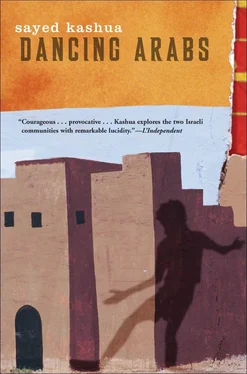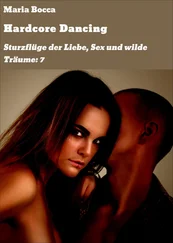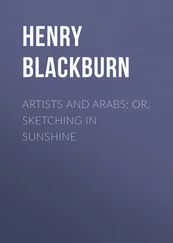The news of Father’s magic spread from Tira to the nearby villages and later to the Galilee. People came in fancy cars, bringing money and gifts, and asked for birth certificates. My father became famous. He didn’t consider it a bother. On the contrary, this new pursuit made him very happy. People started swearing they’d seen my father having dinner with Arafat. Everyone in Tira knew it was Arafat who had asked my father to support the collaborator mayor. And the whole business with the Israeli Ministry of Interior was nothing more than a clever Palestinian ploy. The newspapers began singing his praises, thanking him and saluting him as “the well-known Palestinian hero,” “son of the brave shahid, ” and “the man who has liberated land and administered justice.” My father didn’t react to their show of appreciation. He didn’t say a word. Mornings he’d work in the municipality building, afternoons he’d go to Tulkarm, and almost every evening he was guest of honor at someone’s first birthday party.
Your parents are here,” my wife says, waking me from my Friday afternoon nap. I’d forgotten they were coming. My mother had phoned the day before and told my wife they were coming to see us. She feels she’s missing out on something, and she’s got to see her granddaughter. They’re in the living room now. My mother’s holding her, making noises and expecting a response from the baby, who is dividing her attention between Mother, the bunch of keys in Father’s hand, and my brother, who’s whistling in her face. Her suspicious stares turn to grunts, and before long she’s crying. My mother says it’s our fault, that we don’t come to visit often enough and the baby doesn’t know her own grandparents.
My wife sits the baby on her shoulders and tries to calm her down in preparation for her next round with her grandmother. My wife says my mother doesn’t know the first thing about babies, she doesn’t show the baby any warmth, and it must be her fault that I’m as screwed up as I am.
I shake hands with my parents. Sometimes we kiss. I don’t like it. It feels very strange, very awkward, artificial. Especially when I kiss my father. I never let my lips touch his cheek, I just turn my head toward his lips, which barely graze my cheek.
“How come you’re still sleeping?” my father asks.
“I was working last night.”
“At the restaurant?” he asks. He knows it’s a bar, but my father is always intent on image building.
“At the chamara, the dive,” I correct him.
There are big bags of garbage in the living room and an enormous pile of dishes rising out of the sink. Generally my wife cleans up before guests arrive, but yesterday she was home alone with the baby and didn’t get to it. She tried to straighten up the living room somehow: to clear away the papers, handkerchiefs, banana peels, and peanuts that have been gathering on the table through the week. My wife hates dirt, but she doesn’t stand a chance with me. It’s all because of me. I never help out with the housework or with the baby. My wife says I’m primitive, and I agree.
My parents ask how we’re doing, how things are at work, how the baby is, whether she sleeps through the night or still wakes up every hour. My mother says the baby’s thinner, and my father says she’s still very fat. He lights up, and I take one of his cigarettes too. Again he says he can’t believe I’ve started smoking. I’ve been smoking for eight years now, and he still can’t believe it. He talks about how bad it is, how much he suffers because of the cigarettes, and how he hates himself for not being able to quit, but when it comes to me, I’ve only begun and I could still kick the habit, in his opinion. “How much do you smoke?” he asks and answers his own question, “Two or three cigarettes a day?”
My parents hardly ever visit us. Before the baby was born, they never did. Generally they stay about fifteen minutes, and leave. It’s been two months since ‘id el-fitr, our last visit to Tira, and this time Mother asked Father to make it a longer visit because she misses the baby. All week long she begged him to stay for at least an hour. My father agreed, but under one condition: he wanted Fatma, a friend from his Jerusalem days, to come along. On the way to Jerusalem, he called her and invited her to our house in Beit Safafa, a kind of official meeting place. My mother agreed, as long as she was given a chance to spend as much time as possible with her granddaughter.
Mother detests that Fatma. She won’t let anyone even mention her name. Every now and then, Grandma or Father or one of my aunts does, and it always gets on my mother’s nerves. She says Fatma’s a shameless whore. I’ve never seen Fatma. All I know is that she screwed up my father’s life. Grandma told me once that she’d found a whole bag of letters from Fatma to father — and she burned them all.
The phone rings, and before I have a chance to answer, Father says, “That must be Fatma. Tell her how to get here.”
The husky voice of an older woman says my name and notes that I sound like my father. Fatma says she’s at the “coiffeur,” the hairdresser, and her choice of words leaves no doubt that she belongs to the urban class, the one that uses a lot of European words. She’s from Ras el-Amud, but her hairdresser is in Talpiyot, on Ha-Uman Street. She doesn’t want detailed directions and makes do with the name of our landlord. One of the workers at the hairdresser’s is from Beit Safafa, and he’ll tell her how to get here.
My wife pulls me to the side and says we have nothing in the house. If it was only my parents, maybe it wouldn’t matter so much, but there’s a guest now too. She says I can’t go to the store, because I haven’t washed my face or brushed my teeth, and my eyes are swollen. She’ll go to the store with my brother. He’ll help her carry, too. My brother’s a good guy. Never lets you down.
My wife hands the baby to my mother, and the baby starts crying. My mother strokes her, rocks her, walks back and forth with her from the sink to the garbage in the living room, three steps away, trying to calm her down. It’s no use. My father lights another cigarette, and I take one too. I don’t usually smoke when the baby’s around, but since he’s smoking anyway, I don’t suppose my cigarette is going to make a difference. He smoked when I was little and I’m fine. All my brothers turned out fine.
I open the door. Fatma comes in, wearing a long black dress. She’s about my height, my father’s height. She has a red scarf over her shoulders. She’s dyed her hair and had it blow-dried. She’s fifty, maybe more. I don’t try to decide whether she’s prettier than my mother. They’re different. She looks like the society ladies who get interviewed on Jordanian or Egyptian TV. You don’t see any wrinkles, but you can still tell her age by the area around her mouth and eyes. Her eyelids are heavy. She blinks slowly as if she can hardly lift them.
She shakes my hand and smiles. She asks if I recognize her, and says that she saw me once when I was very little. My father tells her it wasn’t me, it was my older brother. My mother takes one arm off the baby and shakes Fatma’s hand, studying her. Fatma is thinner than she is. Fatma asks how she’s doing, smiles, and strokes the baby, whose crying grows more insistent. Fatma asks, “What’s the matter? What’s the matter?” and says I have a beautiful daughter.
Father sits down on the couch, with a cigarette. “You haven’t changed,” he tells her.
She shakes his hand, sits down, and says that actually she wouldn’t have recognized him. His hair’s gone white, and he’s gained a lot of weight.
Father says, “I haven’t gained any weight,” and pulls in his stomach as he draws on his cigarette. He goes into the bathroom to find a mirror, then comes back and says, “I haven’t gained any weight,” and looks at Mother for confirmation.
Читать дальше












